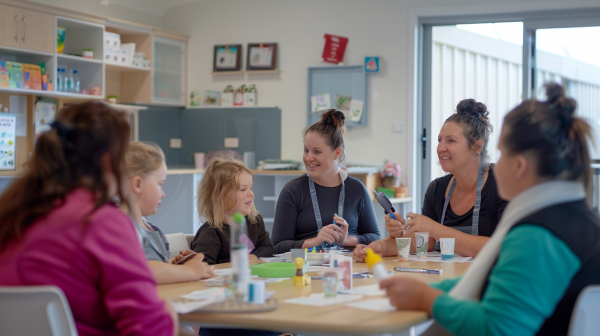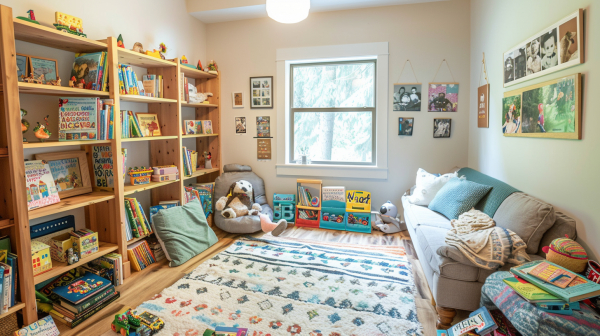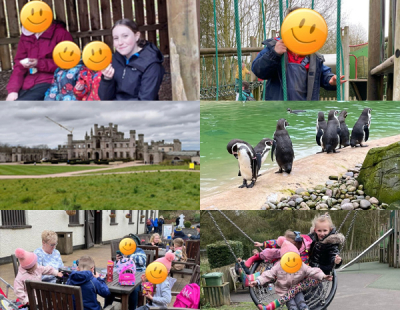News
Why not have a browse through the latest news from our FFC offices around the country and find out what has been going on at FFC in your area.
Unlocking Potential: The Impact of Professional Development on Foster Carers and Children
Written by Colin WatkinsEvery child deserves a nurturing home, and foster carers play a crucial role in providing that sanctuary. With over 57,540 children living with foster families in England, the need for skilled carers has never been higher. Professional development equips these dedicated individuals with the tools they need to meet diverse needs and challenges, ensuring every child in care receives the support they need.
Enhancing Caregiving Skills
Professional development programs offer foster carers an opportunity to enhance their caregiving skills, creating an environment where children can flourish. From managing daily routines to understanding the complexities of trauma, these programs fill essential knowledge gaps, enabling carers to provide tailored support for the children in their care.
- Specialised Training: Programs often include training for different types of fostering, such as parent and baby fostering, ensuring carers are prepared for specific situations.
Supporting Emotional and Behavioral Challenges
Children in care often grapple with emotional and behavioural challenges. Professional development equips foster carers with effective strategies to support these children, promoting resilience and stability. By understanding the underlying issues, carers can respond with empathy and expertise, creating a stable foundation for healing and growth.
- Addressing Complex Needs: Foster carers learn to navigate the needs of children in care living with foster families, a significant proportion as reported by The Fostering Network.
Building a Supportive Network
A robust support network is invaluable for foster carers. Professional development not only enhances individual skills but also fosters connections within the foster care community. Through shared experiences and resources, carers build a network that supports them through the challenges and celebrates the victories of fostering.
- Community and Collaboration: Carers gain access to dedicated placement officers and support plans, which are instrumental in building a cohesive community, Here at Family Fostercare our dedicated and close-knit teams offer friendly, caring, round-the-clock foster support for everyone in the foster family.
Financial Support
Professional development in foster care isn't solely about improving caregiving capabilities; it also provides financial compensation and career advancement opportunities. As carers enhance their skill set, they become more valuable within the fostering system, often leading to increased financial benefits and long-term career development opportunities.
- Help with the cost of fostering: Fostering isn't just an act of kindness; it's a professional path. This article by the UK Government outlines the financial support that comes with being a skilled foster carer.
Legal and Policy Awareness
Staying updated with legalities and policies is critical in the dynamic field of foster care. Professional development ensures that carers are informed about the latest regulations and best practices, enabling them to provide care that is not only compassionate but also compliant with current standards.
- Staying Informed: Foster carers who engage in ongoing professional development are better prepared to navigate the complex legal framework, ensuring the highest care and protection for the children they support.
Personal Fulfillment and Growth
Participating in professional development is a pathway to personal fulfilment for foster carers. As they gain new knowledge and skills, they often experience a significant sense of purpose and satisfaction. This personal development not only enhances their lives but also profoundly influences the children in their care, creating nurturing environments.
- Foster carers report that their role becomes more fulfilling as they advance in knowledge and skills. Understanding the children's needs better and addressing them results in a heightened sense of accomplishment and well-being.
Conclusion
Professional development for foster carers represents a dedication to providing excellent care. It enhances caregiving skills, supports emotional and behavioural challenges, builds strong support networks, offers financial and career benefits, keeps carers updated on legal and policy changes, and encourages personal growth. Investing in the growth of foster carers is crucial for the well-being and future of the children they nurture.
Thinking of becoming a foster carer? Discover the rewards of fostering – Begin your rewarding journey now – Contact us at Family Fostercare to find out more.
5 Steps to Creating a Nurturing Environment for Foster Children
Written by Colin WatkinsA nurturing environment can have a significant impact on a child's life. Such an environment is essential for foster children, who often face uncertainties and transitions. We'll explore five foundational steps that pave the way for fostering resilience and growth in these young lives.
Step 1: Establish Stability and Safety
Creating a stable and safe environment is the cornerstone of nurturing for foster children. It's vital for these kids, who may have faced upheaval and trauma, to feel secure in their new surroundings. Statistics show that 57,540 children are living with foster families in England, which represents 70 per cent of the children in care, highlighting the need for secure environments.
Here are some practical ways to establish stability and safety:
- Maintain a consistent daily routine, providing predictability in their lives.
- Ensure the child has a space of their own, which they can personalise and control.
- Set clear, age-appropriate boundaries and rules that provide structure.
Step 2: Foster Emotional Connections
Trust and emotional bonds are crucial for children who may have experienced broken attachments or trauma. Emotional connections can provide a healing touch, offering foster children the relational security they need. A significant number of these children, 53%, are reunited with their families or placed with relatives, emphasising the importance of maintaining family ties and building new emotional relationships.
To foster these connections:
- Spend quality time with the child, engaging in activities they enjoy.
- Listen actively and validate their feelings, showing they are heard and valued.
- Be patient and persistent, as building trust can take time.
Step 3: Address Mental Health Needs
Addressing the mental health needs of foster children is a critical step in creating a nurturing environment. With up to 80% of children in foster care experiencing significant mental health issues, it is clear that these needs are a priority. As caregivers, we must advocate for and provide access to mental health services when needed.
To address these mental health needs:
- Be observant of any signs of distress or behavioural changes that may indicate mental health struggles.
- Foster open communication about mental health, normalising discussions around it.
- Collaborate with professionals to ensure the child receives the support they need.
Step 4: Promote Educational and Personal Growth
Promoting educational and personal growth is crucial for foster children, as education is a key factor in their future success and stability. While providing a nurturing environment, supporting their love for learning and educational efforts is essential.
To promote educational and personal growth:
- Take an active role in their academic activities and celebrate all achievements.
- Offer a quiet and specific area for homework and study to help focus and learn.
- Support extracurricular activities that match their interests, fostering skill development and self-esteem.
Step 5: Encourage a Sense of Belonging
Cultivating a strong sense of belonging is vital for foster children to feel confident, adaptable, and open to new challenges. Feeling part of a family can greatly affect their growth and future relationships.
To encourage a sense of belonging:
- Include the child in family traditions and rituals, affirming their role in the family.
- Promote interactions with peers and community groups, aiding in the formation of a support network.
- Acknowledge their history and culture, respecting their past as part of their identity.
Creating a nurturing environment for foster children involves ensuring stability, emotional connection, mental health, education, and a sense of belonging. Each step is critical and interconnected, contributing to the holistic well-being of foster children. By committing to these five steps, caregivers can lay a foundation for foster children to develop, learn, and succeed. This commitment to our children's futures is a responsibility and an opportunity to shape the next generation's members of society.
Are you thinking of becoming a foster carer? Explore the transformative fostering journey – Start your fostering adventure with Family Fostercare today.
Becoming a foster carer is a decision that can have a significant impact on the lives of children in need of a supportive home. This guide explores what it entails to take on this vital role and the transformative journey that awaits those who choose to embrace it.
What is Foster Care?
Foster care provides a temporary home for children who cannot live with their biological families due to various challenges such as parental illness, abuse, or neglect. Those who step into the role of foster carers offer crucial stability during a tumultuous period in a child's life.
The system includes different fostering arrangements, from mainstream fostering, which addresses a wide range of children's needs, to family and friends fostering, where a child is cared for by someone they are already familiar with. Currently, there are 36,050 households offering mainstream fostering, with 7,855 family and friends households also playing a significant part in this support network.
Emotional and Social Effects of Fostering
The role of a foster carer is crucial for the emotional and social development of a child. By providing a stable and caring environment, these carers enable children to heal and grow. While fostering can be incredibly fulfilling, it also comes with challenges and requires a strong commitment to the child's well-being.
A foster carer does more than provide shelter; they offer guidance, support, and a listening ear. Notably, 19% of all active fostering arrangements were with family and friends households as of March 2023.
Financial Support for Foster Carers
Foster parents receive an allowance to cover the costs of caring for a child. This financial support is crucial and varies, with the average allowance starting at around £435 per week for the care of a child.
Steps to Become a Foster Carer
The journey to becoming a foster carer begins with an inquiry and progresses through an assessment process, including background checks and training. The selection process is detailed, focusing on the applicant's capability to fulfill the child's needs. It's about commitment and resilience, as well as the adaptability to support a child's emotional highs and lows.
Training and Support
Approved foster carers receive continuous training and support, learning to manage behavioural challenges and understand the legalities of fostering. Support networks play a crucial role, offering a community for carers to exchange experiences and advice.
The journey is one of ongoing learning and adaptation. Support for foster carers is designed to empower them to positively impact the lives of the children they foster.
Qualities of a Successful Foster Carer
Success in fostering hinges on patience, compassion, and resilience. Successful foster carers must be adaptable and committed to being a stable influence in a child's life.
Legal and Ethical Considerations
Foster carers hold significant responsibility, not only in everyday care but also in compliance with child protection laws and respecting the rights of the child's biological family. Ethical considerations encompass confidentiality, cultural respect, and emotional support. Foster carers must prioritise the child's best interests at all times.
The Long-Term View
Fostering often necessitates a long-term commitment. Some placements may evolve into permanent arrangements, such as adoption. Prospective foster carers must be prepared for extended commitments. For children in foster care, stability can enhance life outcomes, from education to emotional well-being. A foster carer's influence can be vital in a child's development and their successful transition into adulthood.
Conclusion
Opting to become a foster carer involves a thorough evaluation of various aspects, from emotional readiness to financial stability. It's a challenging yet rewarding role with a profound impact on a child's life. The increasing demand for foster carers and the available financial support system aim to remove monetary barriers. Training and support help foster carers manage the role's complexities and provide optimal care.
Fostering extends beyond a temporary home; it's about providing a child with opportunities for a better future. If you possess compassion, resilience, and dedication, fostering may be your calling. It's a transformative journey for you and the children you embrace into your life and home.
Join us in creating brighter futures for vulnerable children – Start your fostering journey here.
Here are some photos from yesterdays Easter event
Some of our Foster Carers, families and staff enjoyed a lovely day exploring #lothertonhall and #lowthercastle
We hold regular events throughout the year and hope to see you all at next months circus workshops…. Invites being posted soon
How amazing do these little ones look in their costumes
We hope you have a fantastic day bringing your favourite characters to life.
#familyfostercare
#WorldBookDay2024
#fosterfamilies
PIZZA MAKING FUN
This half term we held pizza making parties for all our children and young people.
It’s always great to see our families at these events, thank you for coming along.
If you want to know more about us and how we can help you begin your journey into becoming a Foster Carer contact us:
This is Iris, read what she has to say about being part of a fostering family.
Thank you Iris for all you do and the difference you make
“ I often get asked, "do you like fostering?" and I can honestly say I do. I am proud to help these young children and make their lives a little brighter.
My mum has been a foster carer for over 15 years so that's all I've ever known, although that full time she has not been a part of the Family Foster Care team. After joining we have both found a massive difference in the support and how much they value our work.
Today, I went on a son's and daughter's day out, which we do twice a year. This is to show thanks for all we do.
Although I do enjoy fostering, I find it hard with all the extra people visiting to speak to the children in our care.
Although it can be challenging, I welcome every child into my home and enjoy watching them grow. I'd like to think I have played a small part in their futures”
#childrenoffostercarers
#familyfostercare
#fosteringuk
#fosteringnetwork
We like to celebrate the children of Foster Carers within our agency .
We showed our appreciation this weekend by inviting all to a fun day at chill factor in Manchester.
We had a great time racing, sledging and making snow angels
#childrenoffostercarers
#fosteringnetwork
#familyfostercare
#supportchildren
More...
BLACKPOOL 2023
Families and staff enjoyed a wet yet wonderful day at Blackpool pleasure beach.
It’s clear to see the weather didn’t spoil the day
We hold several events throughout the year for our families to meet. Next stop … Gullivers valley
#fosterinyorkshire #fosterincumbria #familyfostercare #fundaysout
Well done to everyone who entered our Easter competition!
Written by Family FostercareWell done to everyone who entered our Easter competition.
The entries have been judged and here are the results.
1st place …. Tasty chocolate nests
2nd place …. A whopping Easter cake !
3rd place …. 2 beautiful bonnets
Prizes for all will be on their way very soon.
#familyfostercare #fosterinyorkshire
#fosterincumbria #eastercompetition See less














